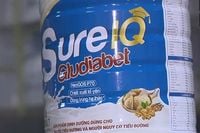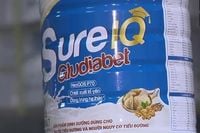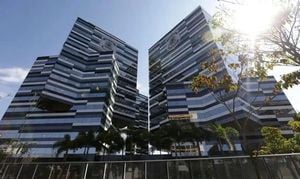On April 22, 2025, the Ministry of Public Security in Vietnam announced the results of an investigation into a large-scale operation producing counterfeit milk products. The operation, linked to Rance Pharma and Hacofood Group, has been found to have manufactured 84 different types of milk powder, distributing over 26,000 cans of potentially harmful products.
Authorities have identified 12 specific types of milk powder that failed to meet quality standards, with some key ingredients falling below 70% of the declared levels, categorizing them as counterfeit goods. The remaining 72 products are still under investigation. Among the notable fake products are COLOS IQ FOR MUM, COLOS IQ DIABETES, and ARIFA A+ ProGold, along with formula milks like KENMIL PREMIUM PEDIA GOAT and Kodo A+ Starter Colostrum 1.
Major General Hoang Anh Tuyen, spokesperson for the Ministry of Public Security, urged the public to refrain from consuming any of the identified products until further notice. The investigation has led to the prosecution of eight individuals on charges of producing and trading counterfeit food products, as well as violating accounting regulations, which has led to serious consequences.
The counterfeit milk production line has reportedly been operational since August 2021. It was founded by Hoang Manh Ha and Vu Manh Cuong, who recognized the rising demand for domestic milk powder. They established Rance Pharma and Hacofood Group, overseeing all aspects from production to distribution.
During investigations, both Ha and Cuong admitted that the nutritional content and information regarding the milk powder were never actually verified. Allegations indicate that the claimed ingredients, which included premium components like bird's nest extract and cordyceps, were never present in the products. Instead, the operation substituted these with cheaper additives to mislead consumers.
The counterfeit milk products were marketed primarily to vulnerable groups, including individuals with diabetes, kidney issues, premature infants, and pregnant women. However, investigations revealed that these products shared the same raw materials and production processes, despite being marketed under different labels.
In a bid to deceive consumers, the defendants manipulated the formulation by adding or replacing certain main ingredients and incorporating artificial flavors. The police have determined that the quality indicators of these milk powders, which fell below the declared levels, are sufficient to classify them as counterfeit.
By the time of their arrest on April 11, 2025, the operation was suspected of producing a staggering 573 types of counterfeit milk powder, reportedly generating nearly 500 billion VND in revenue. Additionally, authorities discovered that Rance Pharma and Hacofood had failed to report actual revenues in their accounting books, causing a loss of over 28 billion VND to the state budget.
As part of the crackdown, police conducted searches at 19 locations, including factories and offices, where they seized 84 types of milk powder products. This operation highlights the critical need for stringent oversight and regulation within the food production and distribution sectors.
In light of these events, the Ministry of Public Security is emphasizing the importance of consumer safety and the need for robust regulatory frameworks to prevent such fraudulent activities in the future. The case has raised significant concerns about food safety standards in Vietnam, prompting calls for more rigorous checks and balances in the industry.
Meanwhile, the E-Commerce and Digital Economy Department has also been active in addressing safety concerns regarding products sold on digital platforms. Le Thi Ha, head of the department, revealed that there have been cases of unsafe and low-quality products being sold online, including a recent scandal involving counterfeit milk.
Ha stated that the department has taken steps to remove thousands of unsafe products from major e-commerce platforms, including functional foods and milk. On April 21, 2025, platforms were instructed to remove all retail prescription drugs, as some pharmaceutical platforms had continued to sell these items online despite being licensed for e-commerce.
Ha noted that a significant volume of counterfeit drugs is still being circulated, necessitating further measures to ensure the safety of online transactions. She emphasized the importance of electronic identification for sellers on e-commerce platforms as a specific policy to enhance consumer protection.
National Assembly Delegate Tran Thi Nhi Ha highlighted the convenience of integrating medicine purchases through the VNeID system but pointed out that the current Pharmacy Law only permits the sale of non-prescription drugs online. With over 80% of drugs on the Ministry of Health's list being prescription medications, she called for legal reforms to facilitate online purchases of prescription drugs.
Nguyen Do Quyen, Deputy General Director of FPT Retail, expressed confidence in the security of purchasing medicines via VNeID, emphasizing that customer consent is required for information sharing. Currently, over 100,000 customers are using the VNeID feature for transactions at Long Chau pharmacies, although only for non-prescription drugs.
Quyen also stressed the need for clear regulations regarding the sale of prescription drugs online, suggesting that only certified platforms meeting state standards should be allowed to sell medicines. This would ensure accountability and safety for consumers in the digital marketplace.
The recent events surrounding the counterfeit milk scandal and the ongoing challenges in regulating e-commerce reflect the urgent need for comprehensive reforms in Vietnam's food safety and digital economy sectors. As authorities continue to investigate and crack down on fraudulent practices, the focus remains on protecting consumers and ensuring the integrity of products available in the market.






